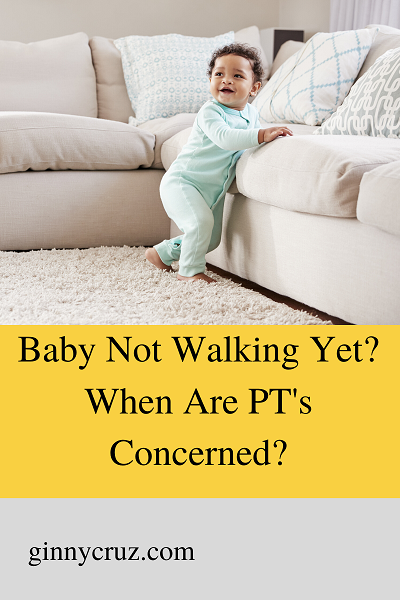Baby Not Walking Yet? When Are PT’s Concerned?
You know you shouldn’t compare your baby to others, but you do. Maybe your older child was on his feet by ten months and this baby is content to sit and watch TV. Or other children in your child’s daycare class are on the move and your munchkin isn’t. Time to worry?
The normal age range in which babies begin taking a few steps is between nine months and fifteen months. That’s a span of six months. Keep in mind this range is for babies born without complications from a normal full-term pregnancy. If your baby was born prematurely or there were other complicating factors, such as birth difficulties, these must be factored into the equation.
Here are a few things a physical therapist is looking at when deciding whether you should be concerned about your baby’s reluctance to walk:
- Delays in other gross motor milestones, such as sitting or crawling
- The reluctance to bear weight on the legs
- Floppy muscle tone or generalized weakness
- Blindness or poor vision
- A lack of desire to explore the environment
If your baby has already been slow to “get moving,” then it may be the case, she will eventually walk. For example, if she learned to sit three months later than is typical, then it’s reasonable to assume she may learn to walk three months later than is usual for walking, which would be around eighteen months of age. This is three months later than the top range of the normal age limit of fifteen months.
However, if your baby is not putting weight on her legs or seems floppy or weak, it is time to seek an evaluation. Some children are weak and demonstrate a lack of motivation or curiosity to explore their world. They are content to be placed in a carrier, an exersaucer, or a similar baby holding container. Nothing makes them happier than watching the world go by. These babies are usually described as easy—easy to keep contained, easy to keep happy, and easy for mom because they make few demands.
If this describes your child, it is time to get her evaluated to ensure there aren’t other things going on that are causing these delays. She may just be a late-bloomer; but, if she’s struggling more than you realize, it’s better to intervene earlier than later.
Click here to find a local office of early intervention in your area (USA only). These services are free to you. If she doesn’t qualify for early intervention services or you do not have those in your area, seek out an evaluation by a pediatric physical therapist.
In the meantime, avoid the exersaucer and the baby walkers. Time spent in the playpen, where she can pull up to standing and cruise sideways would be more helpful to her.
Need a comprehensive list of every milestone your baby should meet in the first year? Click here to sign up for the newsletter and it’ll be on its way pronto!
(Photo from Adobe Stock)

